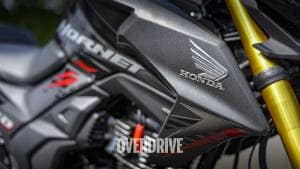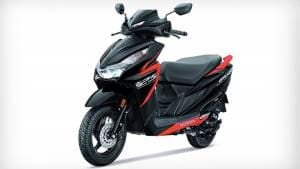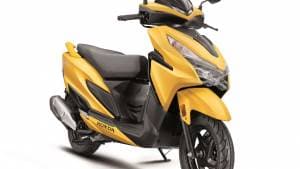Comparison: Honda Grazia vs Suzuki Access 125 vs TVS NTorq 125
I love scooters. I go fast on them, they're super handy in almost every way and perhaps the highway is the only environment that defeats them. And off-road. And one has to with sheer speed and displacement and the other, suspension. While the Honda Activa rules their roost with authority on all counts, the Suzuki Access 125 has carved out a cozy little place for itself and it hasn't gone unnoticed. The excellent Honda Grazia arrived a few months ago with swish styling and a 125cc engine and now the TVS NTorq 125 is here as well. The Aprilia SR 125 is also a challenger though it isn't in this story directly. In any case, the SR125's fate is a bit sealed because it's priced so close to the SR150 that I cannot imagine who wouldn't just pay the difference and get the better scooter of the two in the first place. So. The 125cc scooter king is the Suzuki Access and its challengers are the Honda Grazia and the TVS NTorq 125. Let's have some fun, shall we?
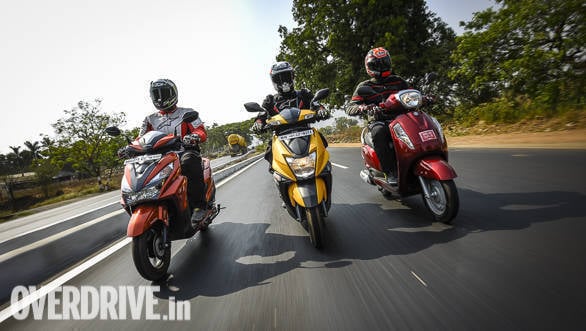
Design, build quality and finish
Unlike motorcycles, the Honda Activa set such a high bar for overall quality that all the scooters that have followed it have been of a very high build and finish level in general. The ones that don't get telescopic fork front suspension tend to clatter over the bumps more, but at the end of the day, scooters in general are extremely well-made in India. The Suzuki Access 125 is exemplary on this count. The gloss of the paint, the fit of the panels... the closer you look, the better this Suzuki looks. The TVS NTorq 125 though, matches this move for move. And the Honda Grazia is no wilting lily either. This is how pitched battles should be fought I say! On the build and finish front, the Grazia feels perhaps a hair less well-built - in the sense that in five years it feels like it will have more rattles than the other two but it's a minimicronanomicron of a difference, to be honest.
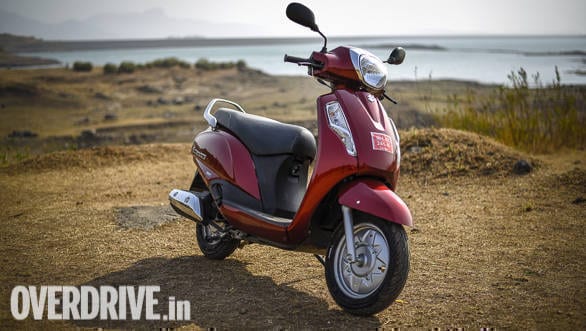
Then comes the design. And Wow. What a difference! The Suzuki Access 125 plays the Honda Activa's game. It's unisex, sleek and meek in a uniquely Japanese-Indian way. It makes no enemies and there is no one I know who calls it the best looking scooter on Earth either. Suzuki could have been more adventurous with the new generation of the Access in theory but as the Honda Activa 5G demonstrates amply, don't fix what isn't broken is a powerful design philosophy for Indian products.
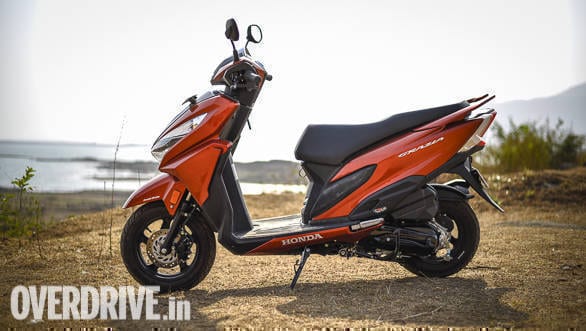
The Grazia looks sleek and modern, especially compared to all of the scooters Honda makes, including the Dio. The aggressive front apron is the busiest of all three and the side panels and the rear treatment also use the same combination of sharp creases, and taut curves to present a sleek, fast, fresh and modern stance.
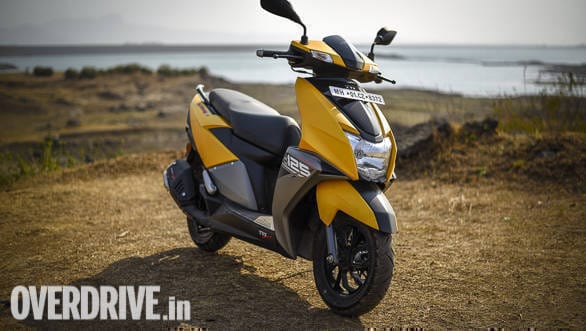
But between the yellow colour and the high contrast body panels, the Ntorq is easily the sportiest scooter in design and it looks freshest as well as sharpest. I think some of this perception comes from the fact that the Grazia chooses a horizontal headlamp alignment and a wide apron versus the TVS that opts instead for a more vertical headlamp set in a narrower front apron. The kink and the lack of curves on the front mudguard, I think, adds to that sense of purpose for the TVS too.
Design is subjective and the build-finish levels are even. So I clearly prefer the sporty intent in the design of the Ntorq 125 to both of the others, but I'm going to call this even. And I will say this once again, choosing a vehicle based on its design shouldn't come from the road test, it should come from your aesthetic sensibility.
Features and convenience
In terms of feature set, all three scooters are very similar at the basic level. Let's tackle the three-four things that implies one at a time.
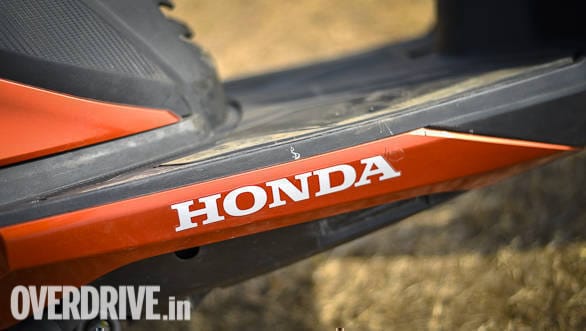
Floorboards are the primary storage area on a scooter and they get used more often than the underseat storage in the big picture. On this count, the Access has the largest one - it doesn't want to be a sporty scooter, remember? The Grazia comes next - it's a Honda. It presents the idea of sporty, but it doesn't want to be too sporty. The TVS is, naturally, the last on this count. It's a narrow footboard with the side front panels coming back inward as sporty scooter styling requires that further hems the footboard in.
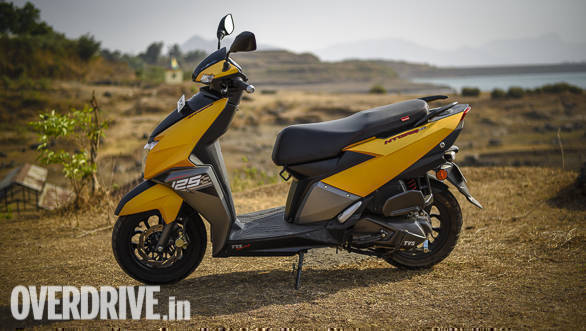
The underseat storage is heavily used and here it flips all the way to the other side. I was carrying around a 10-litre bag, an insulated flask of water, a puffy jacket (compressible volume) and a fairly thick fleece pullover (non-compressible volume) for this test. The 10-litre bag had to go on the footboard in all cases. The four things sat tightly in the Grazia and closing the seat was a bit of a challenge. But the other two swallowed the quartet whole easily and the TVS actually has - surprise - the biggest and most useful underseat cavity. And the little courtesy light is a boon and much appreciated.
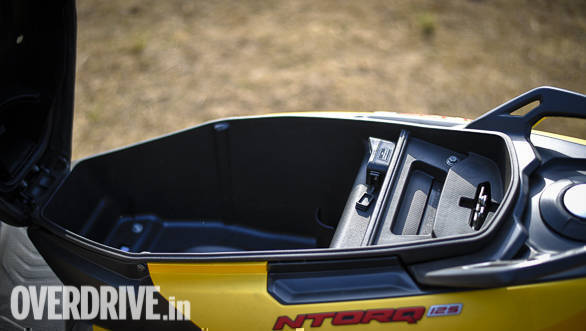
The seat release and fuel cap are an integrated part of using scooters and here the TVS and the Suzuki have an edge of the Honda. The Grazia aims to reinvent the seat release by adding a key-unlocked switch for this. Unfortunately, it's fiddly and it appears to remain locked despite you having completed what appears to be the right sequence of fiddling. This is unnecessary! The Suzuki has the easiest seat release integrating everything into the ignition slow and adding a magnetic lock cover to boot. The TVS uses a simpler mechanism by allow the key hole on the side panel to rotate one way for the fuel cap and the other way for the seat release.
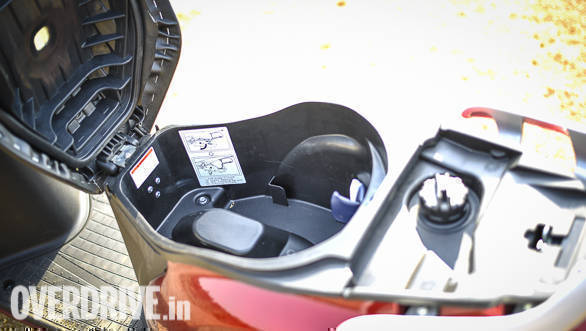
Who wins? It's a tie between the Access and the NTorq. The Suzuki's seat release is easier and the foot board is larger. The TVS NTorq 125 has more space under the seat and it's fuel cap doesn't require you to dismount and open the seat.
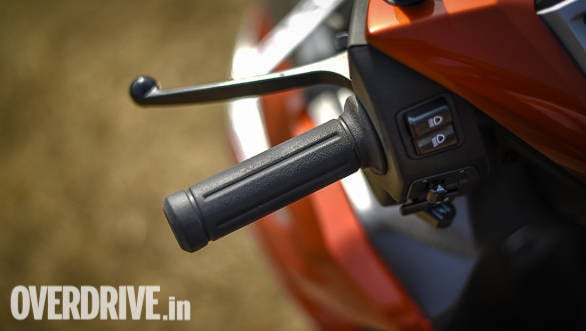
The brake lock lever is the final feature I want to talk about. The Grazia has the worst one here. It's a wierd little metal 'stick' that you pull up to lock the brakes. It feels cheap, underdesigned and not all in keeping with the design of the scooter. The Access has a decent one but the little locking lever on the NTorq is by far the easiest and most satisfying to use. The brake lock is an essential part of automatic scooter safety and you absolutely must use it if you're parking the scooter with the engine running. The NTorq also has the digital connectivity features that permit you to sync you phone to see incoming calls, navigation prompts and more. These features are, at this time, not available on any scooters or Indian-made motorcycles.
Ergonomics
A separate section for ergos? Well yes. Just to clarify that all three should fit everyone easily, short or tall. If you're six foot or over though, watch out on the Grazia, the handlebar is very close to your thigh though it never touched or interfered on the test. The Ntorq, despite its narrow profile and sporty looks actually has the biggest gap from thigh to bar but it feels like the longest reach to the ground for your legs as well.
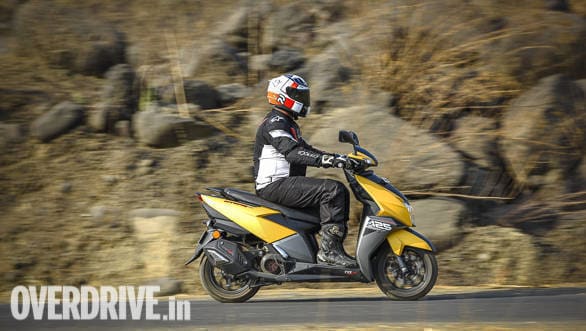
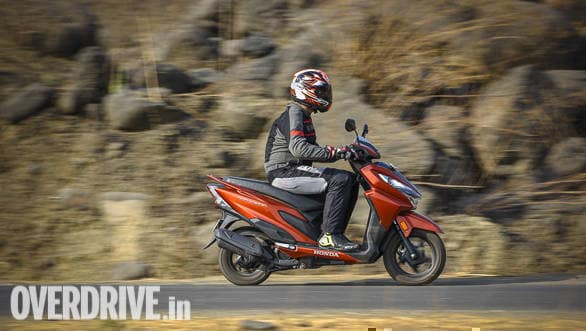
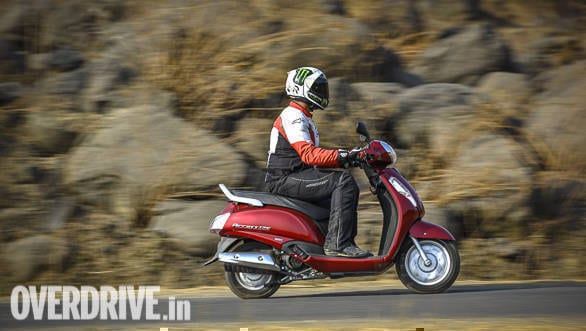
Engines and performance
The Access 125 has been the winner for a long, long time on this count. The way it handled the trifecta of acceleration, economy and refinement has won it many comparos as well as fans. And the Honda Grazia doesn't beat it. It gets to 60kmph 0.2s later, stops a smidge quicker and they both return roughly the same economy too. The NTorq, though has both their numbers. It's quicker to 60s by 0.2s again over the Access (almost half a second over the Grazia!), produces the quickest, most consistent stops and has the best city economy too.
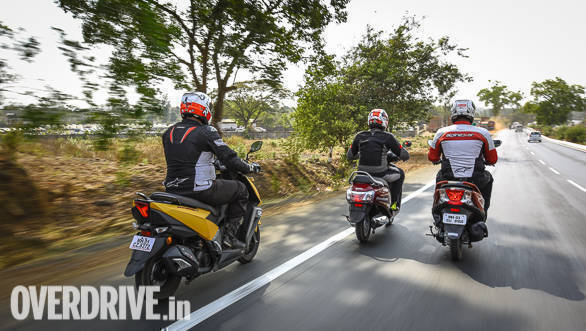
Dominant performance? You don't know the half of it. On our test, the Grazia felt the most leisurely of the three 125cc scooters by some margin. The rider had to work hard to keep up with the other scooters whether taking off from the lights, accelerating past other traffic or cruising out on the highway (yes, we did that too).
The Access is great fun in comparison. The combination of that engine in that meek-sleek body is always a surprise. It's like an athlete wearing a Kanjeevaram. You never quite expect it to lift up the hem and sprint off into the distance. The transmission seems a bit more alert, the engine is audible - the Honda is almost whisper-quiet until you're maxed out - and the Access doesn't mind sitting at max speed for minutes on end either. The Grazia will show you a faint amount of strain when maxxed out.
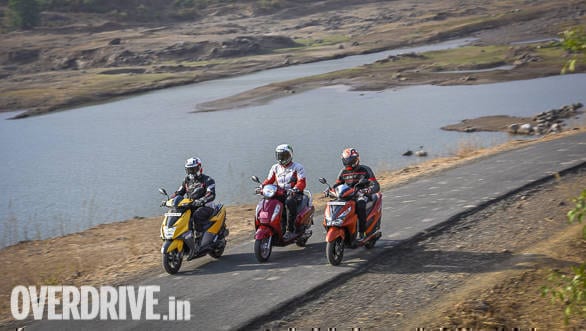
The Ntorq though raises the bar. Not by a huge margin, but you'll notice the gap. It's quicker in every single situation - traffic, empty city roads, traffic lights, highway cruise, and overtaking. There's a thoroughly enjoyable engine note right through and when ridden flat out, it gets near its top speed more rapidly and stays there happily too.
I've had some great rides on the Access 125, both the first generation and the second, but the TVS Ntorq's pace and poise elevates the experience. This is wonderful! I remember saying that TVS should have taken a firmer stand and created an even more sporty package. Well, hats off engineers! This is about as close to real world sporty as I can imagine that won't make anyone think it's too hardcore for them. It's right on the edge and kudos to you for finding this balance with such accuracy! So much praise? Read on.
Ride and handling
The Ntorq is a heavy little scooter and to be honest, TVS' explanation for the weight makes me think that this scooter could easily have been 7-9kg lighter. Ooh, there's that tingly feeling again. But part of its performance advantage - despite the weight - comes from its suspension setup. The Ntorq 125 has the savviest suspension setup in the scooter business right now. It feels stiff initially but you notice that it isn't harsh. But slowly it dawns on you that the Ntorq is very much like, wait for it, the Honda Unicorn! I rolled my eyes when I wrote that too. It feels stiff but when the bumps larger and larger, you begin to feel how supple it is and that's a delicious surprise.
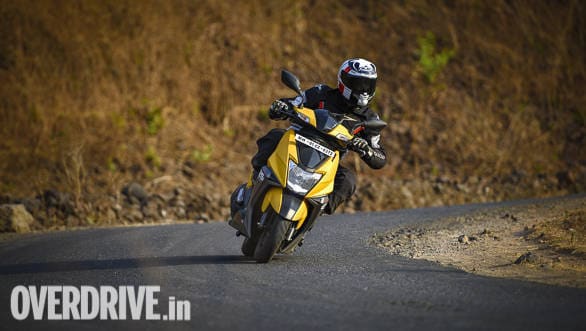
And of course, it handles really rather well. The 12-inch wheels and sticky TVS rubber make this the most cornerable scooter in this class. On a good road, the SR150 might have its number with its 14" wheels, but in the real world, the SR150's stiffness will cause it trouble.
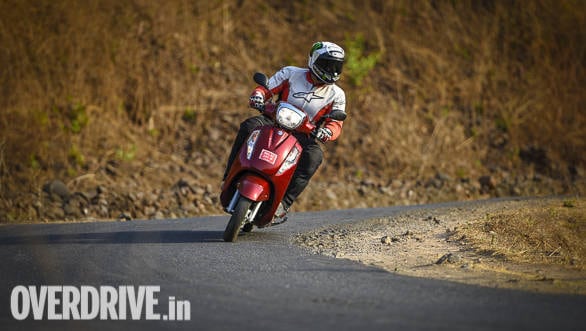
Where does that leave the other two? Behind. The Suzuki Access 125 feels quite a bit stiffer in comparison to the Ntorq and it absorbs less. It still corners with great aplomb and confidence and it's still very much a brilliant all-round scooter. In fact, we jumped at the chance to ride a base drum brake model - all of our previous rides were in the disc-alloy model. I'm happy to report that the front drum may not have the power of the discs on the other two but the Access stops very well indeed.
The Grazia, predictably, is the safest setup of all. It handles bumps well and it goes around corners well too. Unfortunately, despite the sleek looks and sporty intention, the chassis is the old Honda Activa 125-based number and that isn't a sporty platform.
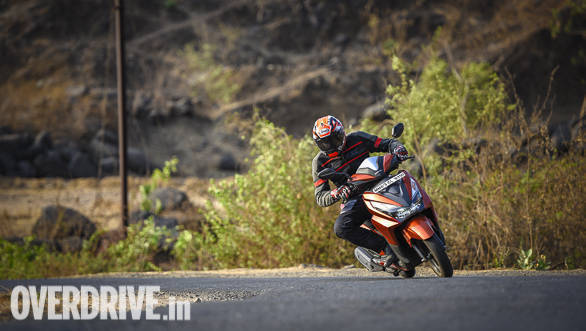
In dynamics terms, the Suzuki Access 125 was already a solid scooter and it remains one. But TVS has really taken the sporty 125 scooter thing seriously and the Ntorq is easier to rider faster than both of the other two.
Verdict
The Honda Grazia is third, then. As it happens in the scooter segment, there are hardly any scooters you can label as not worth buying. Which is most excellent from a market quality perspective. In the case of the Grazia, it has a handful of features you should look at carefully. Honda has the biggest network of these three companies so service will be easier to, er, access. The Honda also has the only LED head light in this trio and in the night that does make a significant difference. The Honda, though, is the most expensive scooter here. Prices start at Rs 59,752 (ex-Mumbai) and go to Rs 64,124 for the top model in the pics. Both the other scooters are roughly Rs 1,000 less expensive and the gap widens a bit further in on-road price as taxes are added on. To wit the top Grazia at Rs 77,996 is Rs 6,641 more than the disc Suzuki Accesss 125. There is a Special Edition Access that's closer - Rs 4,656.
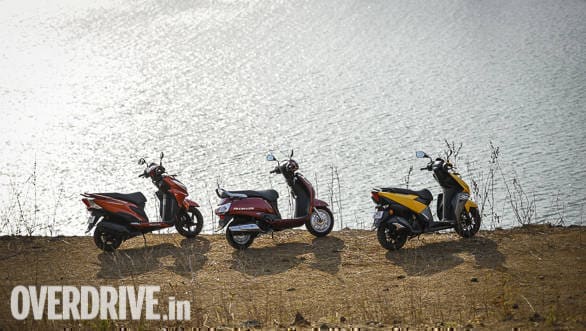
The Special Edition trim adds matte paint, contrast red seat and chrome mirrors to the disc-alloy model. So at prices starting at Rs 55,996 for the drum brake edition and topping out at Rs 62,962 (ex-Mumbai) the Suzuki Access is the most affordable scooter here. The Suzuki Access 125 is still the scooter to buy - and I mean the whole of the scooter market including the 110s - if you have trouble convincing your family about sporty scooters. The Suzuki blends practicality and unisex styling with a genuinely fun riding feel and for a scooter, enjoyable performance. The Suzuki's downside is that the styling is a little too staid for youthful buyers and the company has the smallest service network of all three here.
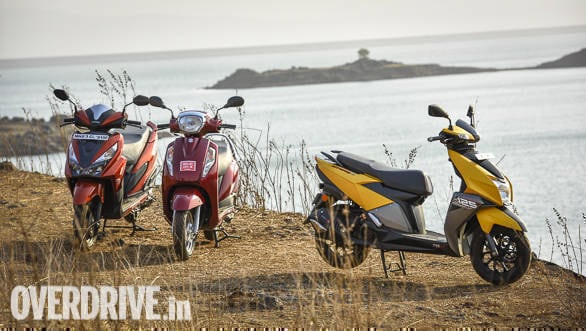
The TVS Ntorq 125, through, is the best all-round scooter money can buy in the country in our books. It looks great, has solid performance as well as refinement, it's dynamic package is unmatchable in the real world and it's priced well too! At Rs 63,256, the TVS Ntorq 125 has only the one all-bells-whistles model. It's Rs 870 cheaper than the Grazia and Rs 2,000 more approximately than the Access 125 (disc). Nicely done, then. TVS are the past masters in benchmarking and beating the competition. We know this. Usually, their products arrive towards the end as each niche or segment fills out. But the Ntorq 125 arrives at exactly the right time and while the SR 125 is definitely a sportier, more youthful scooter, the Ntorq nails the balance between real-world ready and meeting the promises its sporty design makes. That's a runaway winner, despite the slightly contrived name.
Starts Rs 73,912
125cc
CVT
8.52
10.54
-NA-
Starts Rs 64,800
124cc
CVT
8.70
10.20
64 Kmpl
Starts Rs 72,270
125cc
Automatic
9.40
10.50
-NA-
